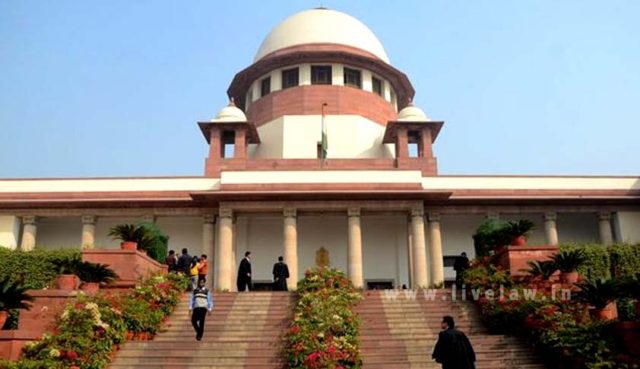Apex Court adjourns hearings on J&K’s special status for 3 months
 NEW DELHI : The Centre on Monday bought time from the Supreme Court hearing petitions challenging special status to Jammu and Kashmir, saying it has appointed an interlocutor to commence dialogue with stakeholders in the restive State.allenging special status to Jammu and Kashmir, saying it has appointed an interlocutor to commence dialogue with stakeholders in the restive State.
NEW DELHI : The Centre on Monday bought time from the Supreme Court hearing petitions challenging special status to Jammu and Kashmir, saying it has appointed an interlocutor to commence dialogue with stakeholders in the restive State.allenging special status to Jammu and Kashmir, saying it has appointed an interlocutor to commence dialogue with stakeholders in the restive State.
Appearing before a Bench led by Chief Justice Dipak Misra, Attorney General K.K. Venugopal said the court should adjourn the hearing on the petitions against Article 35A of the Constitution by six months.
The court settled for 12 weeks in its order. It initially said eight weeks, but added one more month on the request of Mr. Venugopal. “The interlocutor has already commenced talks with stakeholders. If the court continues to hear this case, it will affect the dialogue process,” Mr. Venugopal submitted.
Article 35A is a provision incorporated in the Indian Constitution giving the Jammu and Kashmir State Legislature a carte blanche to decide who all are the ‘permanent residents’ of the State and grant them special right and privileges in State public sector jobs, acquisition of property within the State, scholarships and other public aid and welfare programmes. The provision mandates that no act of the State legislature coming under the ambit of Article 35A can be challenged for violating the Indian Constitution or any other law of the land.
Article 35A was incorporated into the Indian Constitution in 1954 by an order of President Rajendra Prasad on the advice of the Jawaharlal Nehru Cabinet. The controversial Constitution (Application to Jammu and Kashmir) Order of 1954 followed the 1952 Delhi Agreement entered into between Nehru and Sheikh Abdullah extending Indian citizenship to the ‘State subjects’ of Jammu and Kashmir.
“The interlocutor has already commenced talks with stakeholders. If the court continues to hear this case, it will affect the dialogue process,” Mr. Venugopal submitted. The SC will also hear a plea challenging a move to make people link their Aadhaar number to their mobile phone numbers.
Attorney General KK Venugopal had informed the court on October 25 that the extension will be limited to those who have not yet enrolled for Aadhaar Card. Chief Justice Dipak Misra will head the bench that will take up applications seeking cancellation of Article 35(A) that guarantees special privileges to the people of Jammu and Kashmir.
An NGO We the Citizens has filed the main petition in the case which says the state’s autonomous status granted by Article 35(A) and Article 370 of the Constitution discriminates against fellow citizens from the rest of the India. Article 35(A) prohibits people from outside Jammu and Kashmir from buying or owning immovable property there, settle permanently, or avail themselves of state-sponsored scholarship schemes.
The Presidential Order was issued under Article 370 (1) (d) of the Indian Constitution. This provision allows the President to make certain “exceptions and modifications” to the Indian Constitution for the benefit of ‘State subjects’ of Jammu and Kashmir. So Article 35A was added to the Constitution as a testimony of the special consideration the Indian government accorded the ‘permanent residents’ of Jammu and Kashmir.
In 1927, Hari Singh, then the ruler of the state, said that residents would be preferred over outsiders for employment in the government. Article 35A, an extension of this, is part of Article 370, which guarantees Kashmir its own constitution, flag and the right to handle its own laws except on matters that impact national security including defence and foreign affairs.
Critics say that Article 35A empowers the state legislature to change the qualifications or entitlements of permanent residents by a two-thirds majority and residents of the state get various special rights and privileges that are denied to others (who are not permanent residents) about employment, the purchase of property, the right to scholarships and more.
The constitution, through Article 35A, allows Jammu and Kashmir to frame laws that cannot be challenged for violating either its own provisions or other laws. The Parliament was not consulted when the President incorporated Article 35A into the Indian Constitution through a Presidential Order issued under Article 370. Article 368 (i) of the Constitution mandates that only the Parliament can amend the Constitution by introducing a new Article.
A five-judge Bench of the Supreme Court in its March 1961 judgment in Puranlal Lakhanpal vs. The President of India discusses the President’s powers under Article 370 to ‘modify’ the Constitution. Though the court concludes that the President has the power to modify the Constitution under Article 370, the judgment is silent as to whether the President is empowered to bring about a radical change in the Constitution by introducing a new Article. This question remains open till date. (With Agency Inputs ).
.

